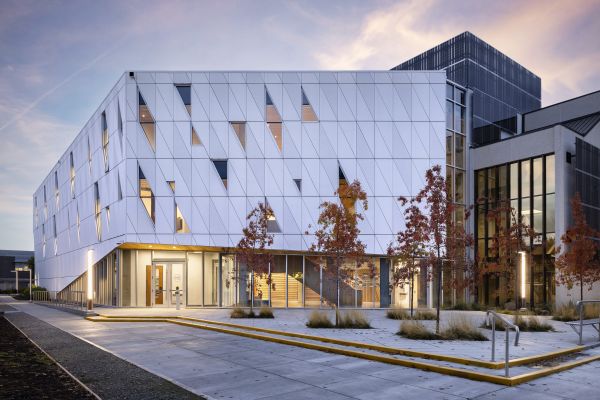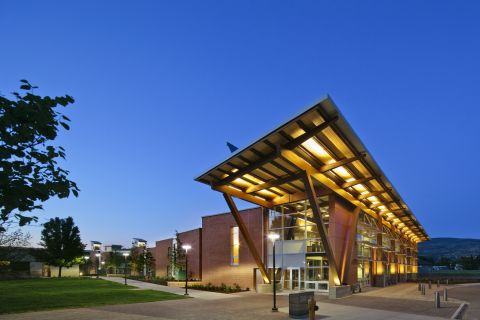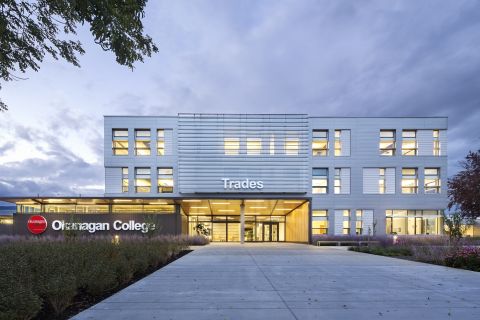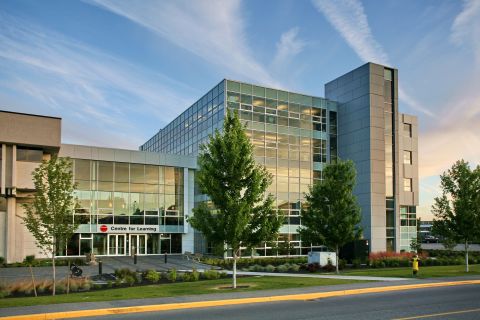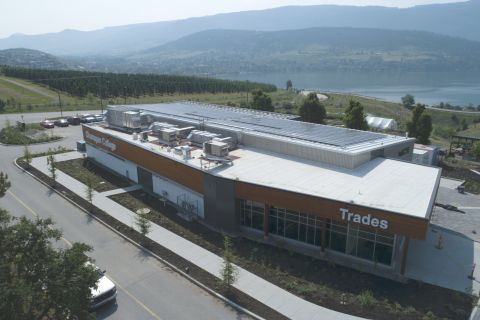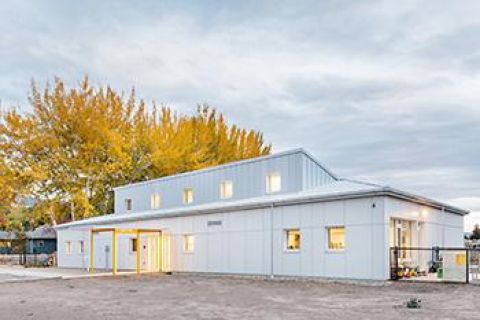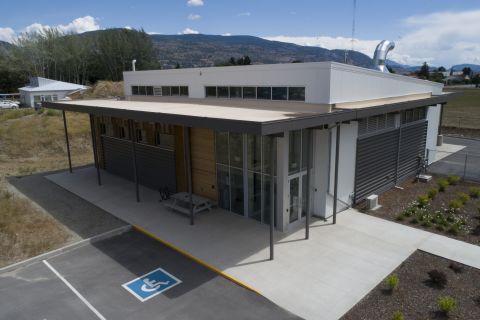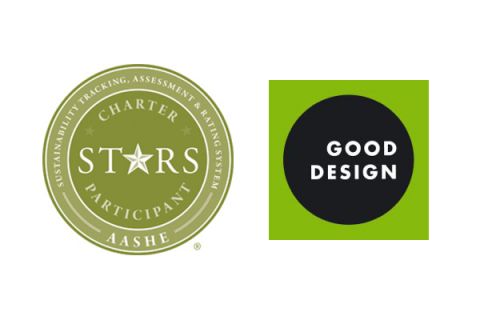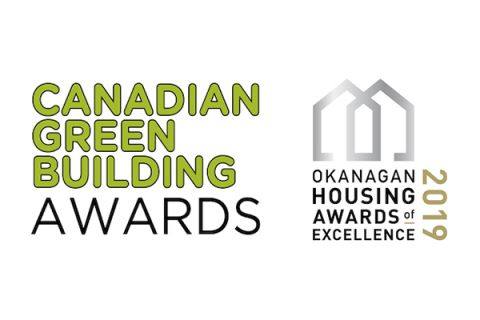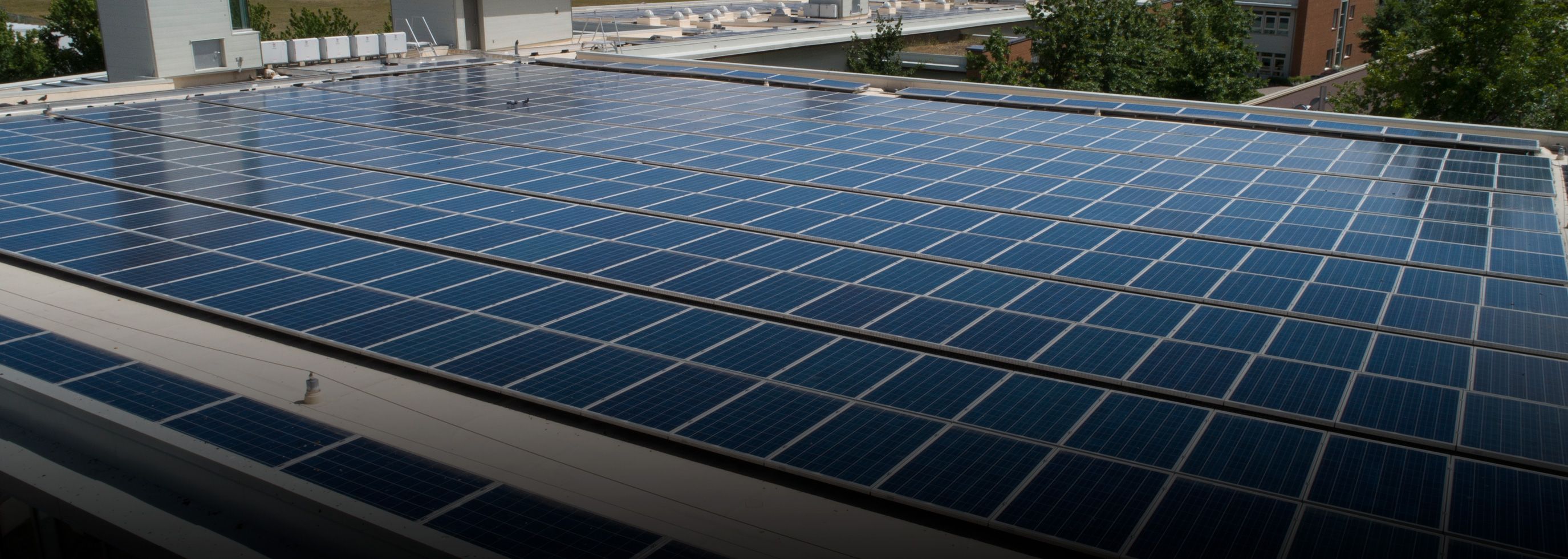
Sustainability
An Okanagan College commitment
Okanagan College is a champion of sustainability, reflected in our physical and social spaces and economic practices. This means, in each of its four regions, we are committed to meeting environmental challenges facing society today. This continues to inform building construction, utility conservation, operations, and HR practices that embrace equity and inclusion for our people.
Sustainably built environment
Check out how much solar energy is being generated from photo-voltaic arrays at the Kelowna campus!
Sustainability every day
Okanagan College is comprised of 4 campuses. The properties represent a total area of approximately 93.5 acres. The footprint for all buildings is equivalent to 16.9 acres. The parking lots and associated asphalt cover an estimated 35.5 acres. The remainder, approximately 41.1 acres is an assortment of treed areas interspersed with turf, natural grassland and various planted arrangements of perennials and indigenous flora. Much of the green area also acts as a natural wildlife habitat. Two of the campuses border natural wetland. Of the 41 acres, almost 75% is either natural non-irrigated terrain or xeriscaped.
Okanagan College focuses on the 3Rs: reduce, reuse and recycle, with a particular emphasis on reducing the create of waste. Periodic trash audits have identified key items that dominate our waste stream: food and drink packaging, coffee cups, and empty water bottles.
- Printing: Okanagan College uses print management software to monitor, track and charge for copying on campus. Learn about Pay Per Print.
- Reuse of goods. The College works with other agencies to find opportunities to donate goods: hospital beds to organizations in Africa, furniture to the Salvation Arm, and surplus equipment to local churches and other institutions. We also hold periodic garage sales to raise funds for bursaries.
- E-waste has been recycled since 2003. All e-waste is collected from departments, then shipped to a smelting operating in Trail, where precious metals are recovered and emissiosn are cleaned through scrubber before being exhausted to the atmosphere.
- Battery boxes can be found in the libraries of all four campuses, and accept standard batteries weighing less than five kilograms. Complete cellphones with batteries are also accepted.
- Composting bins are provided for students and staff in each kitchen. At the end of the day contents are emptied into bins provided outside of the cafeteria building. Pick-up and replacement of compost containers is facilitated through our Department of Facilities Management. We have a pilot program on our Salmon Arm Campus to handle post-consumer waste, with weekly pick-up of all food waste and used paper towels. Two more elements removed from mainstream garbage destined for landfill. We are also presently working on expanding this service to the Vernon Campus.
- Napkins, both table and take-out are made from 100% recycled material and are Certified EcoLogo.
- Campus dining operations offers discounts to customers who use reusable mugs instead of disposable cups in to-go food service operations. Our cafeteria offers one flat fee for coffee in a reusable mug regardless of size. Coffee prices range from $1.25 to $3.25. The price for a reusable mug is $1.50.
- Eco Take Out Reusable Container program also exists. The containers are reusable, microwave safe, dishwasher safe, good for 1,000 washes and can be recycled (#5 on the recycle chart). We currently offer other types of take out containers which are 100% compostable.
All cleaning products used at Okanagan College must fit within the ecologically friendly criteria. Any non-certified products are being replaced and this process is to be completed by 2012. All newly constructed buildings are built to a minimal LEED certification. All cleaning products used in these buildings are required to be “Greenseal” and/or “EcoLogo” certified. s of April 2011, over 65% of the products meet this standard. WIth respect to food services, all seafood is Oceanwise where possible, and Okanagan College follows guidelines provided by the Vancouver Aquarium, Department of Fisheries & Oceans Canada, National Marine Fisheries Services and the Blue Ocean Institute. Two types of coffee are offered on campus, Starbucks and Seattle’s Best, both of which are ethically sourced and Fair Trade. We also offer a selection of organic coffees. The cups used feature 10% Post-Consumer fibre, an innovative food-safe material, and helps to preserve the environment by using an ever expanding menu of both vegetarian and vegan options in the cafeteria, restaurant and by request in the coffee shop. We also use only a zero trans-fat, high heat canola oil for both cooking and deep frying. When excess food is available (both prepared and in raw form) we donate the food to the local Gospel Mission located in Kelowna. The Gospel Mission picks up as required during regular operating business hours.
According to the Okanagan Basin Water Board, 24% of all water used in the Okanagan region is used on household lawns and gardens. Okanagan College has implemented several initiatives to reduce water usage on campus. Irrigation practices as well as plant selection are designed and selected to minimize our water usage wherever possible. Currently, 75% of our green areas are covered with only native plants – requiring only natural irrigation. We have an ongoing plan to continue to replace our green areas with native vegetation as budgets allow. All new construction will allow for the planting of only native flora only. Our Irrigation Practice employs a combination of weather informed control supplemented with timers and manual inspections to ensure we are only watering when absolutely necessary. Several water fountains – some on each campus - have been retrofitted with "bottle fillers" to make refilling reusable water bottles a breeze. An ongoing retrofit program will continue to identify and replace fountains wherever possible. The Centre for Learning in Kelowna uses only low-flow faucets, showers and toilets, as well as waterless urinals. The Centre for Excellence in Penticton has been fitted with low-flow fixtures as well. When required, all shower heads, faucets and water-closets are being replaced with low flow models.
Okanagan College is committed to building sustainable facilities, as evidenced by several projects like the Jim Pattison Centre for Excellence and Penticton day care. Where possible, innovations are considered to improve energy consumption of existing campus structures. In 2003/2004, OC's Facilities Management investigated and implemented a method of using the City of Kelowna Waste Water Treatment Facilities discharge to heat the OC Kelowna Campus by running clear water lines from the Treatment Facility to the OC boiler house and extracting the heat from the clear water to heat the surrounding buildings. This is achieved by using heat recovery chillers and "harvesting" heat from the clear water. In addition, OC has replaced old boilers with high efficiency boilers and replaced old cooling units containing environmentally hazardous refrigerant with new high efficiency, environmentally friendly cooling units. These steps, along with many others to come, greatly reduce energy consumption and pollutant discharge equivalent to 819 tonnes of carbon dioxide annually. This allows OC to focus its resources even more on educational purposes while preserving the environment. Okanagan College is committed to reducing green house gas (GHG) emissions under the Kyoto Protocol in efforts to reduce our depleting ozone.
The College’s Sustainable Transportation Plan is continuously being updated to meet the changing needs and expectations of the population. Highlights include: carpool matching service with preferred parking spots, car sharing, parking pass opt-out policy, anti-idling policy, and bike lockers. Students and staff can take advantage off all the possible ride sharing opportunities available through carpool.ca. Staff have a second option through our O.C. staff car pooling utility: go to MYOkanagan > Employee > OC Express - Requests and Notices > Carpool There are currently a limited number of carpool parking stalls at the Penticton (Lot P1) and Kelowna campuses (Lot 14). These stalls are open to both staff and students. To park in these stalls all riders’ parking passes must be fully visible on the dash and rear-view mirror of the vehicle. Electric car charging stations are available on all four main campuses.
Okanagan College respectfully acknowledges that our Penticton, Kelowna and Vernon campuses are located on the traditional and unceded territory of the Syilx Okanagan people and our Salmon Arm campus is located on the traditional and unceded territory of the Secwepemc people.
The Syilx Okanagan and Secwepemc peoples have taken care of their homelands for thousands of years. Okanagan College is respectful of the Syilx-Okanagan and Secwepemc peoples, their knowledge, language and history, as well as their ongoing relationship to the land and natural world.
Okanagan College's strategic direction of Indigenization has resulted in several initiatives that knit together sustainability and traditional Indigenous knowledge and ways of doing:
- na’ʔk’ʷulamən garden - an Indigenous garden outside of the Centre for Learning Building in Kelowna uses very little water. It features more than 50 plant varieties, selected specifically because of their significance to local Indigenous people and ability to thrive in the warm Okanagan climate.
-
K’nmaĺka? Sənqâĺtən garden - an Indigenous garden at the Vernon campus that showcases medicinal and food plants from the traditional Okanagan lands, transplanted by Elders, family and Indigenous students.
STARS
The College continues to participate in the STARS (Sustainability Tracking and Assessment Rating System), administered by the Association for the Advancement of Sustainability in Higher Education. The process involves a rigorous examination of practices, policies, and achievements that contribute to sustainability. Okanagan College currently holds a Silver rating and is planning to resubmit in 2018 to help establish new benchmarks and targets going forward – particularly with regards to our greenhouse gas emissions.
Carbon reporting
Okanagan College has established goals for itself to exceed the provincially mandated Bill 44 targets for carbon emissions with an annual carbon emission reduction of 80 tons per year.
The institution has undergone several infrastructure upgrades. While in pursuit of the Carbon Zero designation, the College is required to develop a strategic Zero Carbon Transition Plan, which includes energy reduction strategies, financial analyses of alternatives, and development of a long term heating plan free of fossil fuel combustion. Using Lean methodology, we are constantly reviewing administration processes in different departments to encourage reducing, where practical, unnecessary paper‐based filing systems. Continued monitoring of our fleet vehicles and usage patterns as well as technology developments in video conferencing will help us optimize travel related emissions.
Read Okanagan College’s Carbon Neutral Action Report for 2020.
Contact us
Have an idea on how Okanagan College can make a difference? Contact Rob St. Onge, Sustainability Manager, at 250-762-5445, ext. 4876 or send an email.

